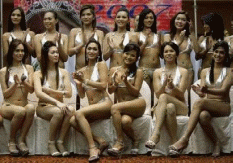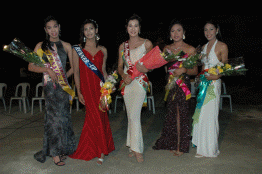All of modern people heard much about beauty contests and Miss World, discussed pro and cons of such contests and their impact of the world. Thus, I am sure you have never heard about another type of beauty contests, provided among men, or better to say gay men. These contests are very popular in the Philippines and involve two classes of gay beauty competitions in Jolo and Zamboanga. These are community-level contests held in the open air, usually at the community basketball court, and municipal competitions such as the Miss Gay International, Jolo, which are usually held in large auditoriums such as the Notre Dame de Jolo College gymnasium (Atkinson 43).
In Philippines, It is an official contest which gathers thousands of people, women and men, children and old people who value good taste and friendly atmosphere. In community contests, there is no admission fee. As a result, community-level competitions will usually attract a much more diverse audience, including those who might not otherwise pay to attend a downtown contest. With the exception of people on the extreme peripheries of towns and municipal centres the majority of people have attended at least one community-level gay beauty contest or similar event, such as a talent or fashion show (Atkinson 48; The Amazing Lady Boys of the Philippines2008).
For gays, beauty contests are regarded as celebratory events or ‘happenings’ and are best expressive of what is for many, particularly younger gays, seen to be one of the defining characteristics of gay life, that is, being happy and having enjoyment. Beauty contests encapsulate the sense of empowerment and pleasure articulated in the notion of ‘exposing my beauty’ (Atkinson 49). There is another aspect to this, however, inasmuch as beauty contests are, as the name suggests, competitive events in which gays invest considerable time, energy and money preparing costumes, rehearsing dance routines, and perfecting recitations. In fact, while in the run up to a beauty contest gays will often help each other out by exchanging clothing, accessories and make-up, at the beginning of a contest, camaraderie gives way to fierce competitiveness (The Amazing Lady Boys of the Philippines 2008, See Appendix 1,2).
There is nothing vulgar or rude in these competitions. Such performances are, of course, exaggerated characterizations, parodies of the stereotypically self-absorbed with which gays are commonly identified in mainstream culture. This sometimes extends to the way gays treat their customers, where exaggerated flattery, for example, of a boy’s manliness, are pointed parodies of the discourse of hypermasculinity. In part, these re-presentations of and (identifications with such stereotypes are clearly one way in which certain aspects of the dominant discourse may be destabilized (Atkinson 47). Gays in the parlour are thus usually quick to defend themselves against any unsolicited comments or intrusions from customers and other people hanging around the parlours (usually men) who, in comparison with audiences at beauty contests, were usually more subdued spectators (The Amazing Lady Boys of the Philippines 2008).
Although not absent in gay beauty contests, the sense of parody and camp which characterizes gay discourse in beauty parlours is usually submerged by the much stronger sense of ‘sentimentality and seriousness’ at these events. Contrary to what might be expected, gays are not battling over any monetary award. Only the finalists receive trophies, plaques, ribbons and special product-line packages (Atkinson 23). Nor do gays, despite the widely articulated project of status transformation, see participation in beauty contests as a means out of ‘poverty’ or a peripheral ‘backwater’, as has been suggested of Thai transvestitebeauty contestants since, unlike Thailand, there are no national competitions from which to launch careers as entertainers in the metropolis. “At first glance the Amazing Philippines Beauties Contest may seem like your average beauty pageant, well it’s certainly true what they say – “looks can be deceiving” – because all of the contestants are transsexual” (Philippines Lady/Boy beauty Contest 2007).
On the other hand, what gays are contesting (both among themselves and with the audience) is not just the measure of sexuality, but also the nature or quality of the transformation they see themselves enacting in exposing their beauty. In gay imaginations America and beauty represent the possible site for the realization of their transgenderal feelings. Nowhere is this more clearly articulated than in the context of beauty contests. As gays frequently put it, ‘I want to expose my beauty, so the world will know that I am a woman.’ (Atkinson 141). The particular images of femininity which gays attempt to embody, although varied, draw on images which are commonly presented in the media, educational institutions and the political rhetoric of state institutions. Gays clearly identify themselves as progressive, educated, and independent as well as glamorous, sophisticated and cosmopolitan women, educational qualifications and body measurements, as well as in the elaborate stage performances and wearing of ‘cocktail’ or ‘evening’ gowns and swimsuits. At the same time, however, gays also project a shy, quiet, self-effacing image of femininity, defined primarily in terms of motherhood and domesticity, creating what, following Blanc-Szanton, might be called an image of the ‘modern woman of traditional virtue’. (Atkinson 76).
In fact, it is at beauty contests that parlour rivalry emerges most clearly, since in many contests each parlour will sponsor one or more of their beauticians or another gay closely associated with it as their contestant, and the results of the beauty contests will often be discussed and debated among them for weeks and indeed months and years afterwards. Rather, what gays are contesting is precisely their possession of, and hold over, the knowledge-power (potency) of America, which is demonstrated by their ability to embody and articulate, with apparently as little effort as possible, the total ensemble of elements in the beauty contests — beautiful faces, sculpted bodies, glamorous costumes, the English language and various performative talents. An important part of the competition is given to the displays of national and ethnic costumes and the rhetoric of national politics. In aligning themselves with these images of femininity, and specifically in juxtaposing the glamorous with the maternal, what some gays are specifically attempting to do is to distance themselves from associations with the vulgar, indecent and ‘overexposed’, and to ally themselves with a socially acceptable but high status image of femininity (Atkinson 44).
The point for gays is that in the beauty contests as in the beauty parlours, the sense of enjoyment and empowerment and the source of conflict between them emerge in their attempts to elicit a positive response not just from the judges, but from the audience as well.
Works Cited
The Amazing Lady Boys of the Philippines. 2008. Web.
Atkinson J. M. The Art and Politics of Wana Shamanship. Oxford, University of California Press, 1989.
Philippines Lady/Boy beauty Contest. 2007. Web.
Appendix
Lady/Boys

Gay Beauty Contest
